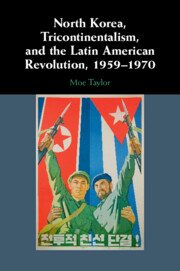Book contents
- North Korea, Tricontinentalism, and the Latin American Revolution, 1959–1970
- North Korea, Tricontinentalism, and the Latin American Revolution, 1959–1970
- Copyright page
- Dedication
- Contents
- Acknowledgements
- Abbreviations
- Introduction
- 1 North Korea and the Cuban Revolution, 1959–1965
- 2 Building the Anti-imperialist, Anti-US United Front, 1966–1970
- 3 Solidarity with the Latin American Revolution
- 4 North Korea as a Model of Development
- 5 North Korea as a Model of Development
- 6 North Korea as a Model of Revolution
- 7 The End of the Anti-imperialist, Anti-US United Front
- Conclusion
- Index
7 - The End of the Anti-imperialist, Anti-US United Front
Published online by Cambridge University Press: 18 May 2023
- North Korea, Tricontinentalism, and the Latin American Revolution, 1959–1970
- North Korea, Tricontinentalism, and the Latin American Revolution, 1959–1970
- Copyright page
- Dedication
- Contents
- Acknowledgements
- Abbreviations
- Introduction
- 1 North Korea and the Cuban Revolution, 1959–1965
- 2 Building the Anti-imperialist, Anti-US United Front, 1966–1970
- 3 Solidarity with the Latin American Revolution
- 4 North Korea as a Model of Development
- 5 North Korea as a Model of Development
- 6 North Korea as a Model of Revolution
- 7 The End of the Anti-imperialist, Anti-US United Front
- Conclusion
- Index
Summary
Cuba’s shift to a more pragmatic and Soviet-aligned foreign policy in the early 1970s had major implications for its relationship with North Korea. Moreover, it influenced radical changes in North Korea’s own foreign policy. Pyongyang announced the “era of chajusŏng” (independence) and an apparent new faith in what could be achieved through peaceful diplomacy, multilateralism, and non-alignment. Key events influencing these shifts were the de-escalation of the Vietnam War, the defeat of the Latin American insurgencies of the 1960s, Nixon’s troop withdrawal from South Korea, Sino-US rapprochement, and the growing power of the Third World in the United Nations General Assembly. As both North Korea and Cuba adapted to a rapidly changing international environment in the early 1970s, the basis for their special partnership dissolved. Cuba and Vietnam moved closer to the Soviet Union, and North Korea reconciled with China, while repositioning itself as a member of the non-aligned Third World. The possibility that the militant Third Worldism of the Tricontinental Conference might grow and coalesce to constitute a real force in global politics appeared to fade away with the 1960s.
- Type
- Chapter
- Information
- Publisher: Cambridge University PressPrint publication year: 2023

